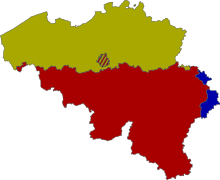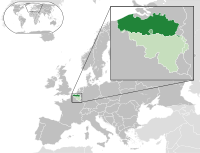Flemish dialects
| Flemish | |
|---|---|
| Vlaams | |
| Vlaams | |
| Native to | Belgium,Netherlands,France |
| Region | Belgian Flanders,Zeelandic Flanders,French Flanders |
| Ethnicity | Flemings |
Native speakers | 6.5 million (2016)[1] |
| Dialects | |
| Language codes | |
| ISO 639-1 | nlforDutch |
| ISO 639-2 | dut(B)forDutchnld(T) |
| ISO 639-3 | nld– inclusive code forDutchIndividual codes: vls–West Flemishzea–Zeelandiclim–Limburgish |
| Glottolog | dutc1256Dutch |
| IETF | nl-BE |
| Person | Fleming (Vlaming) |
|---|---|
| People | Flemings(Vlamingen) |
| Language | Flemish (Vlaams), VGT(Vlaamse Gebarentaal) |
| Country | Flanders(Vlaanderen) |

Flemish(Vlaams)[2][3][4]is aLow Franconiandialect clusterof theDutch language.It is sometimes referred to asFlemish Dutch(Vlaams-Nederlands),Belgian Dutch(Belgisch-Nederlands[ˈbɛlɣisˈneːdərlɑnts]), orSouthern Dutch(Zuid-Nederlands). Flemish is native to the region known asFlandersin northernBelgium;it is spoken byFlemings,the dominantethnic groupof the region.[5][6][7][8]Outside of Belgium Flanders, it is also spoken to some extent inFrench Flandersand the DutchZeelandic Flanders.[1][9][10]
Terminology
[edit]The termFlemishitself has become ambiguous. Nowadays, it is used in at least five ways, depending on the context. These include:
- An indication of Dutch written and spoken inFlandersincluding the Dutchstandard languageas well as thenon-standardized dialects,including intermediate forms between vernacular dialects and the standard. Some linguists avoid the termFlemishin this context and prefer the designationBelgian-DutchorSouth-Dutch
- A synonym for the so-called intermediate language inFlandersregion, theTussentaal
- An indication of thenon-standardized dialectsandregiolectsofFlandersregion
- An indication of the non-standardized dialects of only the formerCounty of Flanders,i.e. the current provinces ofWest FlandersandEast Flanders,Zeelandic FlandersandFrench Flanders[11]
- An indication of the non-standardizedWest Flemishdialects of the province ofWest Flanders,the DutchZeelandic Flandersand FrenchFrans-Vlaanderen
Glottologconsiders Western Flemish to be a separate language, classified as a part of the Southwestern Dutch family together with theZeelandiclanguage. According to Glottolog, Western Flemish includes the dialects of French Flemish and West Flemish. Brabantian and East Flemish are classified as Dutch dialects, under the Central Southern Dutch dialect group.[12]Ethnologueconsiders Limburgish and West Flemish to be separate (regional) languages.[13][14]
Characteristics
[edit]Dutch is themajority languagein northern Belgium, being used in written language by three-fifths of the population of Belgium. It is one of the three national languages of Belgium, together withFrenchandGerman,and is the only official language of theFlemish Region.
The various Dutch dialects spoken in Belgium contain a number of lexical and grammatical features that distinguish them from the standard Dutch. Basic Dutch words can have a completely different meaning in Flemish or imply different context,[15]comparable to the differences between the British and North American variants ofEnglish.As in the Netherlands, the pronunciation of Standard Dutch is affected by the native dialect of the speaker.
All Dutch dialect groups spoken in Belgium are spoken in adjacent areas of the Netherlands as well. East Flemish forms a continuum with both Brabantic and West Flemish. Standard Dutch is primarily based on theHollandicdialect [16](spoken in the Western provinces of the Netherlands) and to a lesser extent onBrabantian,which is the dominant dialect inFlanders,as well as in the south of the Netherlands.
Tussentaal
[edit]The supra-regional, semi-standardized colloquial form (mesolect) of Dutch spoken in Belgium uses the vocabulary and the sound inventory of the Brabantic dialects. It is often called an "in-between-language" or "intermediate language", intermediate between dialects and standard Dutch.[17]Despite its name, Brabantian is the dominant contributor to the Flemish Dutchtussentaal.
It is a rather informalvariety of speech,which occupies an intermediate position betweenvernacular dialectsand thestandard language.It incorporates phonetic, lexical and grammatical elements not part of the standard language but drawn from local dialects.
It is a relatively new phenomenon that has been gaining popularity during the past decades.[when?]Some linguists note that it seems to be undergoing a process of (limited) standardisation[18][19]or that it is evolving into akoiné variety.[20]
Tussentaalis slowly gaining popularity in Flanders[when?]because it is used a lot in television dramas and comedies. Often, middle-class characters in a television series will be speakingtussentaal,lower-class characters use the dialect of the location where the show is set (such as Western Flanders), and upper-class characters will speak Standard Dutch.[21]That has giventussentaalthe status of normalcy in Flanders. It is slowly being accepted by the general population, but it has met with objections from writers and academics who argue that it dilutes the usage of Standard Dutch.[22]Tussentaalis used in entertainment television but rarely in informative programmes (like the news), which normally use Flemish accents with standard Dutch vocabulary.
Belgicisms
[edit]Abelgicismis a word or expression that occurs only in the Belgian variant of Dutch. Some are rarely used, others are used daily and are considered part of the Belgian-Dutch standard language.[23]Many belgicisms are loanwords and words or expressions literally translated from French (also calledgallicisms); others, in contrast, are actually remarkablypurist,such asdroogzwierder(a compound of Dutchdroog"dry" andzwierder"spinner" ) meaning "spin dryer" (common standard Dutch:centrifuge,a loanword from French), andduimspijker(a compound of Dutchduim"thumb" andspijker"nail" ) meaning "thumbtack" (common standard Dutch:punaise,a loanword from French). Among the belgicisms, there are also many words that are considered obsolete, formal, or purist in standard Dutch. Moreover, many belgicisms have their origin in theBelgian official nomenclature.For example,misdaad"felony" is not a legal term in the Netherlands, but it is in Belgium.
Etymology
[edit]The English adjectiveFlemish(first attested asflemmysshe,c. 1325;[24]compareFlæming,c. 1150),[25]meaning "fromFlanders",was probably borrowed fromOld Frisian.[26]TheOld Dutchform isflāmisk,[27]which becomesvlamesc,vlaemschinMiddle DutchandVlaamsinModern Dutch.
The wordVlaamsitself is derived fromIngvaeonic*flâm-,from Germanic*flauma-,meaning 'flooded'. The nameVlaanderenwas formed from a stem*flâm-,with a suffix-đr/dr-attached.[28]
See also
[edit]- Belgian French
- Dutch in Belgium
- French Flemish,the West Flemish dialect as spoken inFrance
- Languages of Belgium
- Zeelandic,a transitional dialect betweenWest FlemishandHollandic
References
[edit]- ^Depending on the definition of "Flemish" in context. Brabantian is classified as a dialect of Dutch. It is spoken in the historicalDuchy of Brabant,spanning the Belgian provinces ofAntwerp,Flemish BrabantandBrusselsthat are part of the modern region of Flanders.
- ^Depending on the definition of "Flemish" in context. Limburgish is either classified as a dialect of Dutch or as a separate language altogether. It is spoken in the historicalDuchy of LimburgandCounty of Loon,spanning the Belgian province ofLimburgthat is part of the modern region of Flanders.
- ^ab"ATLAS – Dutch: Who speaks it?".University College London.Retrieved26 November2016.
- ^"Flemish, Vlaams".BBC.14 October 2014.Retrieved26 November2016.
- ^De Cock, Barbara (2006),Flemish language policy in an era of globalisation(PDF),Gencat.cat,retrieved3 May2017
- ^"Flemish language, Alpha bet and pronunciation".Omniglot.Retrieved26 November2016.
- ^Lichfield, John (18 December 2007)."Belgium: A nation divided".The Independent.Retrieved3 May2017.
- ^Leidraad van de TaaltelefoonArchived2013-10-21 at theWayback Machine.Dienst Taaladvies van de Vlaamse Overheid (Department for Language advice of theFlemish government).
- ^Harbert, Wayne (2007).The Germanic Languages.Cambridge University Press.
- ^Kooij, Jan (2009). "Dutch". In Comrie, Bernard (ed.).The World's Major Languages(2nd ed.). Routledge.
- ^Casert, Raf (20 February 2005)."Belgium Bickering Over French and Dutch, Its Dual Languages".Los Angeles Times.Retrieved26 November2016.
- ^"About Belgium – Language Matters".Beer Tourism.Retrieved26 November2016.
- ^Konig, Ekkehard; van der Auwera, Johan, eds. (1994).The Germanic Languages.London & New York: Routledge.
- ^"Vlaams".Glottolog.Retrieved2020-07-20.
- ^"Linguistic map of Benelux".Ethnologue.1999-02-19.Retrieved2013-10-17.
- ^TheirISO 639-3codes arevlsandlim,respectively.
- ^Janssens, Guy; Marynissen, Ann (2005).Het Nederlands vroeger en nu.Leuven & Voorburg: Acco.,155 ff.
- ^"De gesproken standaardtaal: het Algemeen Beschaafd Nederlands"[The standard spoken language: General Civilized Dutch].Structuur en geschiedenis van het Nederlands Een inleiding tot de taalkunde van het Nederlands(in Dutch). Niederländische Philologie, Freie Universität Berlin. 2014-06-10.Retrieved2015-08-10.
- ^Geeraerts, Dirk (2001),"Een zondagspak? Het Nederlands in Vlaanderen: gedrag, beleid, attitudes"(PDF),Ons Erfdeel(in Dutch), vol. 44, pp. 337–344,retrieved2012-01-19
- ^Janssens, Guy; Marynissen, Ann (2005).Het Nederlands vroeger en nu.Leuven & Voorburg: Acco.,196.
- ^"Algemeen Vlaams".VlaamseTaal.be.Retrieved2013-04-14.
- ^Rys, K. & J. Taeldeman (2007). Fonologische ingrediënten van Vlaamse tussentaal. In: D. Sandra, R. Rymenans, P. Cuvelier et al. (red.),Tussen taal, spelling en onderwijsArchived2022-12-26 at theWayback Machine.Essays bij het emeritaat van Frans Daems. Gent: Academia Press, 1–9, p.2.
- ^Standaardtaal of tussentaal op televisie(PDF)(in Dutch), Universiteit Gent,retrieved2014-08-28
- ^Vervaeke, Leen (8 February 2014)."Actie tegen onverstaanbare Vlaamse 'tussentaal' op televisie".De Volkskrant(in Dutch).Retrieved2014-08-28.
- ^Jo Verhoeven,Illustrations of the IPA: Belgian Standard Dutch(PDF)
- ^"Flēmish",Middle English Dictionary(MED)
- ^"Flēming",Middle English Dictionary(MED),retrieved2013-10-17
- ^"Flemish".Online Etymological Dictionary.Etymonline.which citesFlemischeas an Old Frisian form; but compare"flāmisk",Oudnederlands Woordenboek (ONW),which givesflēmisk, flāmisk
- ^"flāmisk",Oudnederlands Woordenboek (ONW)
- ^Instituut voor de Nederlandse Taal:De Geïntegreerde Taal-Bank:
Woordenboek der Nederlandsche Taal (WNT), entryVlamingI;
cp.: Oudnederlands Woordenboek (ONW), entryflāmink:"Morfologie:afleiding, basiswoord (substantief):flāma ‘overstroomd gebied’;suffix:ink ‘vormt afstammingsnamen’ "; Vroegmiddelnederlands Woordenboek (VMNW), entryVlaendren:"Etymologie:Dat.pl. vanflandr-'overstroomd gebied' met het suffix-dr-. ".
Cognate to Middle Englishflēm'current of a stream':Middle English Compendium → Middle English Dictionary (MED):flēm n.(2)

